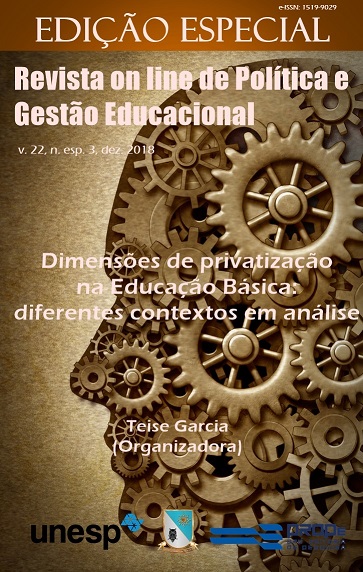Access to full-time education trends in Brasil: dissonant courses in basic education
DOI:
https://doi.org/10.22633/rpge.v22iesp3.12013Keywords:
Full-time education, Enlarged time, Basic Education, Educational oportunities, Right to education.Abstract
In recent years, full-time education experiences have reached national scope, gaining space in educational policies agendas, especially with the new Educational National Plano of 2014. At first sight, these orientations seems to indicate an increase in the right to education, as scholar time is extended, even in high school level. Nevertheless, this process needs to be analyzed more carefully. In this regard, this work aims to identify how access to full-time education has increased in the three basic education levels, in order to observe the development patterns for educational opportunities. The methodology used consisted in bibliographical review and descriptive statistical analyses, based on school census, in the period from 2010 to 2017. As a result, it was observed an increase in full-time education in all levels of education, however with very different paths, particularly in high school level.Downloads
References
BRASIL. Lei n.º 9.394, de 20 de dezembro de 1996. Estabelece as Diretrizes e Bases da Educação Nacional. Brasília/DF, Diário Oficial. 1996.
BRASIL. Lei nº 10.172 de 2001. Aprova o Plano Nacional de Educação (2001-2010). Brasília/DF, Diário Oficial. 2001.
BRASIL. Lei nº 11.494 de 2007. Regulamenta o FUNDEB. Brasília/DF, Diário Oficial. 2007.
BRASIL. Lei nº 13.005 de 2014. Aprova o Plano Nacional de Educação (2014-2024). Brasília/DF, Diário Oficial. 2014.
BRASIL. Lei nº Lei no. 13.415 de 2017. Aprova a Reforma do Ensino Médio. Brasília/DF, Diário Oficial. 2017.
CAVALIERE, A. M. V. Escola de tempo integral versus aluno de tempo integral. Em Aberto, Brasília, vol.22, n.80, p.51-63, abr.2009.
CAVALIERE, A. M. V. Anísio Teixeira e a educação integral. Ribeirão Preto, Paidéia. v. 20, n. 46, p.249-259, maio-ago. 2010.
CAVALIERE, A. M. V. Escola pública de tempo integral no Brasil: filantropia ou política de Estado? Educação & Sociedade, Campinas, v. 35, nº. 129, p. 1205-1222, out.-dez. 2014.
COELHO, L. M. C. (Org.). Educação integral: história, políticas e práticas, Rio de Janeiro: Rovelle, Faperj, 2013.
COELHO, L. M. C. História(s) da educação integral. Em Aberto, Brasília, v. 22, n. 80, p.83-96, abr. 2009.
LECLERC, G. F. E.; MOLL, J. Programa Mais Educação: avanços e desafios para uma estratégia indutora da Educação Integral em tempo integral. Educar em Revista, Curitiba, Brasil, n. 45, p. 91-110, jul-set. 2012.
SCHIMONEK, Elisangela Maria P. Programas governamentais para a educação em tempo integral no Brasil e Portugal: implicações sobre as desigualdades educacionais. 2017. 443p. Tese (Doutorado em Educação). Faculdade de Educação, Universidade Estadual de Campinas - Unicamp, Campinas/SP. 2017.











